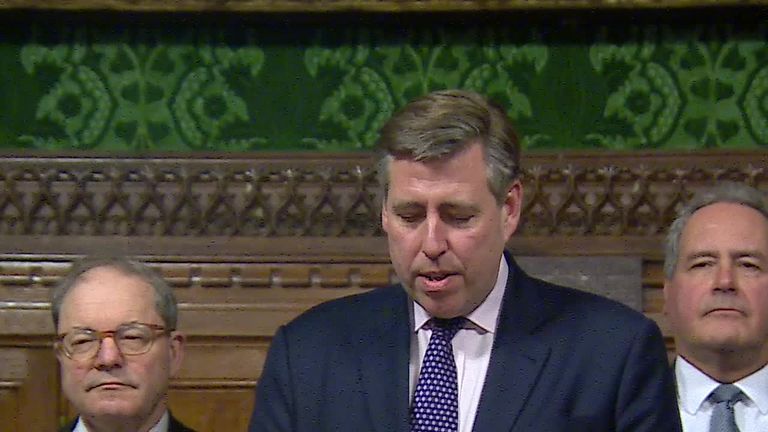Weak and at the mercy of her cabinet: PM fights on as rebels plot
Future leadership contenders will continue with their preparations for a leadership contest, whenever it comes.
Monday 17 December 2018 11:38, UK
During last year's general election campaign, Theresa May was ridiculed and called "the Maybot" for repeatedly declaring: "Nothing has changed."
But 18 months later, after surviving the move by Tory mutineers to oust her in a confidence vote by a comfortable 200 votes to 117, nothing really has changed.
She carries on as before: weak, at the mercy of her cabinet - some of who are already plotting to succeed her - and with no majority in the Commons.
The good news for the prime minister is that at least she cannot be challenged again, under the Tories' leadership rules, for another 12 months.
The bad news is that her Brexit deal is no more likely to get through the Commons than it was before the humiliating retreat when she pulled the vote on Monday. The parliamentary arithmetic has not changed.
During the two hours of voting between 6pm and 8pm, a number of Conservative MPs told me they voted for her in the confidence vote but they remain strongly opposed to her EU withdrawal deal.
Victory came at a price, of course. According to loyalists inside Committee Room 14 when Mrs May addressed the 1922 Committee minutes before the vote, she was "quite emotional" when she signalled she would step down before the next election.
Home Office minister Victoria Atkins, seen as a Tory rising star, admitted she too was on the edge of tears when the prime minister - pushed by the anti-May Brexiteer Adam Holloway - made her big concession.
Jacob Rees-Mogg, leader of the coup to oust her, was unimpressed. He said she said "it was't her intent" to fight the next election. "But it was that word 'intent'. It's a classic politician's word," he said.
One of Boris Johnson's leading lieutenants in the Commons also told me after the meeting he thought the prime minister made a poor speech. Well, he would, wouldn't he? Another Brexiteer sneered: "It was Maybot."
Some MPs also concluded that she had only vowed to step down if the next election is not until 2022 and that if there is one earlier, or a snap election in the next few months, she will still be leader.
Her exact words, according to one MP present, were: "In my heart I would have loved to have led us into the next election, but I realise that we will need a new leader with new objectives for the 2022 election."
Inside the meeting, Leaver Lee Rowley, who captured North East Derbyshire for the Tories last year, was most brutal during questions to the PM after her speech. "Stamina is not a policy, prime minister," he said.
Now this vote is over, besides the breakdown of trust between the prime minister and her Tory backbenchers, the other thing that has not changed is her fractious relationship with the DUP.
Before addressing the 1922 Committee, Mrs May had a 45-minute meeting with Arlene Foster and Nigel Dodds at Westminister. She then told the '22 she had promised the DUP a veto on the Irish backstop. But that was swiftly denied by the DUP.
That brings us to the threat of a motion of no confidence in the government in the Commons being threatened by Jeremy Corbyn's Labour Party, backed by the smaller opposition parties.
Earlier this week Labour announced, in what looked like a statement of the obvious: "We will put down a motion of no confidence when we judge it most likely to be successful."
The plan was - and still is - to wait until the prime minister comes back to the Commons without any worthwhile pledges or concessions after her European travels: her moment of maximum weakness.
Mr Rees-Mogg and his European Research Group (ERG) would have done well to show the same patience and restraint. They moved too soon. Their timing was poor and they've blown it for a year now.
They were out-manoeuvred by Downing Street, the Tory high command and the government machine. And - to their apoplectic fury - by the 1922 Committee chairman Sir Graham Brady.
He has proved once again that he can be relied upon as a loyal ally of the prime minister, so much so that the Tory right on the backbenches will surely move to oust him from his post at the earliest opportunity.
Once he had received the required 48 letters to trigger a vote, he did everything possible to help the prime minister survive: a speedy vote giving the ERG little or no time to organise and a platform for the prime minister to win over wavering MPs just before they voted.
Despite their defeat, nothing has changed for the ERG either. They won't go quietly or call off their guerrilla warfare, but will continue their carping, campaigning, rebelling and attempting to undermine the PM at every turn.
The contenders for the Tory crown, meanwhile, will continue with their preparations for a leadership contest, whenever it comes: holding Christmas drinks parties for MPs, fundraising and doing deals with supporters and potential rivals.
Boris Johnson is the bookies' favourite. He hasn't stopped campaigning for the leadership since the 2016 referendum and he won't stop now. Nothing has changed for him, either.
At the end of 2017, the year of Theresa May's general election disaster, one of her inner circle told me: "We're still here." After this confidence vote, the same is true 12 months later. Nothing has changed.







